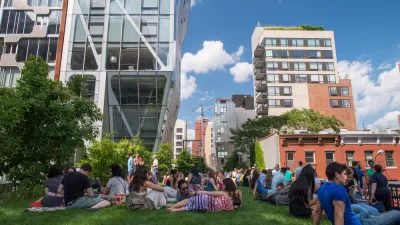Erin Anderssen takes a critical look at the role of our cities in the provision of much needed childcare. While municipally-delivered childcare has been successful in Scandinavia, some Canadian cities are left playing with alternative approaches.
While many major cities have prioritized attracting a young and cosmopolitan creative class, what happens when these urbanites become both professionals and parents? In North American cities, childcare seems to be hard to find and even harder to pay for.
Looking to Europe, Erin Anderssen observes that “child care is an essential service and cities may be in the best position to deliver it – with proper funding from higher levels of government. For example, Sweden’s top-ranked programs are managed at the municipal level, where it is easier to monitor demand and to oversee quality.”
While a European-style system is not likely in the cards for most North American cities, Anderssen notes that cities can still play a part, pointing to Vancouver, which, “has created half of its licensed group spaces by giving incentives to developers who include a daycare in their design plan. For example, the 42-storey Shaw Tower has, as well as offices and condos, a regulated, non-profit child-care centre.”
“Nearby New Westminster has adopted similar measures, loosening regulations for centres in apartment buildings, and financing child-care grants through parking fees.”
FULL STORY: The procreative class: How cities can help on the child-care front

Planetizen Federal Action Tracker
A weekly monitor of how Trump’s orders and actions are impacting planners and planning in America.

Maui's Vacation Rental Debate Turns Ugly
Verbal attacks, misinformation campaigns and fistfights plague a high-stakes debate to convert thousands of vacation rentals into long-term housing.

Restaurant Patios Were a Pandemic Win — Why Were They so Hard to Keep?
Social distancing requirements and changes in travel patterns prompted cities to pilot new uses for street and sidewalk space. Then it got complicated.

Charlottesville Temporarily Has No Zoning Code
A judge ordered the Virginia city to throw out its newly revised zoning code, leaving permitting for new development in legal limbo.

In California Battle of Housing vs. Environment, Housing Just Won
A new state law significantly limits the power of CEQA, an environmental review law that served as a powerful tool for blocking new development.

Boulder Eliminates Parking Minimums Citywide
Officials estimate the cost of building a single underground parking space at up to $100,000.
Urban Design for Planners 1: Software Tools
This six-course series explores essential urban design concepts using open source software and equips planners with the tools they need to participate fully in the urban design process.
Planning for Universal Design
Learn the tools for implementing Universal Design in planning regulations.
Heyer Gruel & Associates PA
JM Goldson LLC
Custer County Colorado
City of Camden Redevelopment Agency
City of Astoria
Transportation Research & Education Center (TREC) at Portland State University
Jefferson Parish Government
Camden Redevelopment Agency
City of Claremont




























